SP Senator Tiny Kox visits the Middle East
SP Senator Tiny Kox visits the Middle East
SP Senator Kox visited the Middle East in his capacity as Rapporteur for the Council of Europe in Israel-Palestine. Below is a summary of his daily reports.
07-04-2013 Today there are 100,000 Syrian refugees just over the border with Jordan, tomorrow there will be a further 2000, and every day at least that many are added. The international ‘mayor’ appointed by the United Nations, explains how complicated it is to organise the reception of such a mass movement of a people. 'We began by saving people’s lives, picking up refugees who no longer had a life on the other side of the border, because of all the atrocities of the Syrian civil war. To start with it was a matter of thousands, then tens of thousands, now hundreds oif thousands, and that’s just in this camp, Za'aatri, north of the capital Amman. Now we have a town to maintain, a town which is growing ever bigger but which lacks any structure. It’s no surprise that a lot’s going wrong. Everyone has to eat, drink, use the toilet. There are no social bonds, not to mention the extent of criminality. We are heavily understaffed, and the Jordanian police have only a few hundred officers here. At the same time excellent work is being done, and the aid funds and aid goods that we are receiving from all over the world are being employed outstandingly well. Jordan in particular deserves praise; the country is so poor and the pressure of the refugees so enormous. Don’t forget that there were also a great many earlier refugees who found shelter here, from Palestine, Iraq and other places. But it’s an extremely difficult task, because we don’t know what will happen in Syria tomorrow. If the battle for Damascus begins, Jordan will be overrun by new waves of refugees. But should the regime fall, this camp could empty out completely within a few days. Nobody knows, yet we have to be sympathetic.
Middle East
That goes especially for the civilians from Syria now finding shelter here. I hear the most appalling stories, of murdered parents, children shot dead, massacres in the towns and villages from where these people come – and the lack of any prospects in their current existence. Why is the world doing nothing to unseat President Assad’s regime, why are the Russians supporting the government, why aren’t the rebels given any chance to defend themselves, why isn’t more aid being sent to us? All relevant questions, none of which I can answer now. I can only confirm that here a humanitarian disaster of massive proportions is occurring and the world can’t stop this, despite all the tremendous efforts which are being made here. By the UN High Commission for Refugees, by the World Food Programme, by UNICEF, which looks after all the children, who together form more than half of the population of this enormous temporary town. I watch in wonder as French soldiers perform a mass vaccination programme, complete with crying children and mothers trying to comfort them. I am reduced to silence by the Moroccan doctors who provide emergency assistance to a baby who has stopped breathing. I look in awe at the workers from Jordan trying to ensure that everyone gets a fair share of the food stocks. Rows break out often, even fights, and yet the work must go on. Giving up isn’t an option, you hear them say. I take my hat off to all of these courageous people who are trying to combat a catastrophe. And I ask myself what has to happen before the world understands that the less we do now, the greater the problem will soon be.
For Jordan too. The country has been touched by the Arab Spring, reforms have been proclaimed, elections held. Yet unrest is still just as great. The more unstable Jordan becomes, the greater the influence this will have on a region already mired in problems; as well as the Syrian tragedy there is the endless conflict between Israel and Palestine.
Red carpet for guests in Amman
The King of Jordan
08-04-2013 The King of Jordan has no time to pose for a series of photos, but he does take time to talk to us about what’s going on in his country, with so many conflicts with neighbours and a major process of internal reform. Jordan must in his view become a democracy, with serious political parties of left, right and centre and a functioning parliament. The Constitution has been amended, a Constitutional Court installed and a supervisory electoral council.
Following January’s elections, for the first time a prime minister was appointed after consultation with parliamentary groups. Today the government assembled by the premier faces a confidence motion in parliament. The king is still not content: the parties are scarcely coherent, the MPs are too concerned with their own interests. The country will have to do what the king says he wants, and become a constitutional democracy with a monarchy whose powers are limited.
I tell him that this is unique, a king who wants to give up powers and pressure parliament to become stronger, and I take the opportunity to ask him about Jordan’s role in the Israeli-Palestinian conflict. The king says that all of those involved must do their homework to prepare a new summit in Washington later in the spring. He will be exploring this via confidential talks in his country.
Going to Washington makes sense only if this preparedness is in place. He hopes that soon in Washington President Obama will also make his views clear regarding any involved party not prepared to make a real contribution. Whether this will happen remains to be seen, as does even whether the summit will happen at all.
The future is difficult, especially when it comes to the Middle East, the monarch says. It would help if Europe would put pressure on all those involved to do something at last, certainly also in the case of Israel. The Israeli Prime Minister told him that he wanted to act, but we’re still as always waiting.
The most acute problem is now Syria, says King Abdullah II. His country is buried under refugees, and the costs associated are out of control, the tensions growing. With half a million refugees on top of the half million immigrants already there, Syrians now make up a large slice of the population, and everyone is looking for a house, food, drink, electricity. More aid from abroad must arrive if things aren’t to get out of hand.
What certainly must be found, the king warns, is a solution in Syria. He is convinced that President Assad’s end is in sight. But a takeover of the country afterwards by radical Islamists must be prevented. The risk exists, says Abdullah. His soldiers are fighting now against the Taliban in Afghanistan, but recently Jordan has had its own Taliban, just over the Syrian border. He hopes that the Syrian Alliance is capable of bring things under more control in order to prevent a tragedy in which everyone will soon be the loser.
In talks with the Premier, the Foreign Minister, MPs and the extra-parliamentary opposition, one thing is clear: without a sustainable solution for Palestine no real peace will come to the Middle East.
That’s why it’s time now to set a course from Amman for the other bank of the Jordan in order to ask our Palestinian partners for their views. In kilometres not so far, in time a real trek. Anyone who wants to go from Jordan into Palestine must first present themselves to the Israeli border guards who, as is so often the case, aren’t all that helpful, despite the guarantees we were given in advance. But soon we’ll be in Ramallah - insh'Allah.
Overtime
09-04-2013 The Palestinian President, as he so often does, is working overtime, receiving in his palace Tony Blair, and soon John Kerry, after which he will fly to Qatar to meet with Arab partners. And now, fresh from Jordan, it’s our turn.
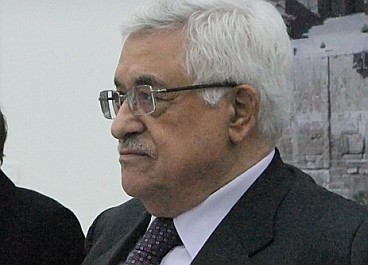
Palestinian President Mahmoud Abbas
President Abbas was accompanied by his chief negotiator Saeb Erakat. Amongst all the faces with which he had been confronted in the last few days, I was pleased that Abbas still recognised me. We had met each other earlier in Ramallah, but also in the Netherlands and Strasbourg. In the short time available, the President recalled that he had made an agreement with Israel, and that his occupied country was prepared to meet all previously stipulated conditions. But, says a tired-looking Abbas, what does that matter if Israel evidently doesn’t want any such thing? Palestine recognises Israel, no doubt possible, but when will Israel at last recognise Palestine? That’s what he will be saying straight away in his meeting with Secretary of State John Kerry.
The US President gave the impression that he would in his second term do more to restart the completely stalled peace process than he did in his first four years, when he had the Palestinians feeling that he was leaving them in the lurch. Prospects continued to appear a little rosy when he made a speech in which he held out to the Palestinians the prospect of UN recognition. After that, little more was heard in Ramallah from Washington. So it makes sense that President Abbas is not overcome with enthusiasm about the new American intervention. But because he is willing to try everything, and must do so if he is to offer his people a better future, he will listen to Kerry and tell him that the US must no longer support Israel’s occupation of his country, which conflicts with international law, or Israel’s intimidation of his people, or their imprisonment or shooting them dead, as happened last week. Two boys were killed by Israeli soldiers, the latest in a long line. He is calling on Europe to put more pressure on Israel, if we really want something to happen.
Prisoners
09-04-2013 Four of her five sons are in the Israeli prison, and they have been there for years. The fifth was shot dead by the Israeli occupier of her country. She has spent a great deal of her life visiting her four sons and grieving for the fifth. We meet her in the refugee camp in Ramallah, a camp which dates to 1948. Nowhere to call home, no homeland, no prospect of anything better: if that isn’t a breeding ground for aggression and dogged struggle, then I don’t know what is. Also, even if foreign big shots are in Palestine off and on at the moment, confidence amongst the Palestinians that this time something will come of it is vanishingly small. 'Yesterday John Kerry wanted to talk to President Abbas about the economy. But we want to talk about autonomy, a country of our own, with solid borders and no Israeli interference. This has been promised us time after time, and we don’t need to be satisfied with anything less.’ I heard this all day long, in meetings with ministers, judges, MPs, human rights activists, journalists, business people, clergy. At the Electoral Council it was explained that Palestine is ready technically for elections, and that there is a chance that the rival Palestinian factions have recently come very close to agreement over a date. But, the Chair of the Electoral Council tells us, we have no guarantee whatsoever that the power which has been in illegal occupation since 1967 will respect the result of elections.
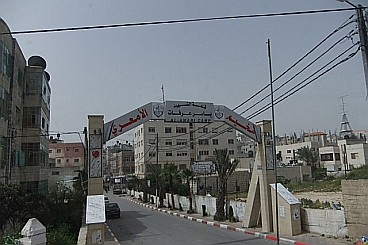
Refugee Camp Ramallah
Respect is hard to find on the Israeli side, as was clear also when we met with the Minister for Prisons. It sound crazy to us that since 1967 800,000 civilians have been locked away by the occupying power and people continue to enter and leave prison on every day, but the minister explained that this is a necessity. At the moment 4,900 Palestinians are held in seventeen prisons in Israël, amongst whom are a few hundred children and adolescents aged between twelve and eighteen. Some prisoners have spent twenty years or more behind bars, often longer than Nelson Mandela, though nobody’s heard of them, one person says bitterly. There’s a strong feeling that the US and EU will simply let Israel do what it likes, certainly when it comes to respect for Palestinian detainees. I take good note of this and will be urging the Council of Europe to make greater efforts to improve their lot. For the MPs who sit not in their parliament but rather in an Israeli cell, for the children who are removed from their beds in the night and then intimidated and abused in the prison. For the prisoners who are ill, who are often lack the necessary medical help and sometimes die in custody. For the prisoners who arecollectively punished or put into solitary confinement. My colleagues support this view, including the Dutch Labour MP Khadija Arib, who just like me is moved by all of the misery which the Palestinian people have had to endure.
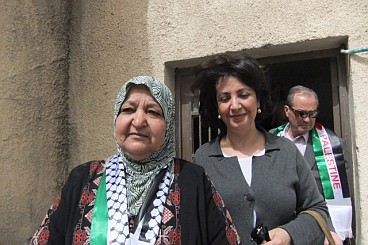
Khadija Arib, a Labour MP from the Netherlands, with a mother who has four sons in prison
In the evenings when we eat with a group of Palestinians I have the opportunity to speak about the relationship between Palestine and the Council of Europe. I say that I thought the decision courageous when two years ago Palestine applied to become a ‘Partner for Democracy’ and was awarded this special status, voluntarily accepting a large number of obligations. As the rapporteur on the partnership, I note that the Palestinians will hold to their commitments on human rights, elections, the fight against corruption, and an independent judiciary, because it is in their own interests to do so. If Palestine is ever to be free, it will be vital that these elements survive. But, I continue, the other side of the cooperation is that Europe must do a great deal more to help protect the human rights of the Palestinian people, and that cannot be achieved unless a more emphatic stance is taken against the illegal occupation and colonisation of Palestinian territory by neighbouring Israel.
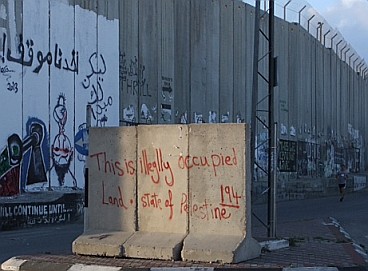
Wall in Bethlehem, several meters high
Teargas
10-04-2013 Teargas drifts over the high ‘Wall of Shame’ in Bethlehem. Harsh noises can be heard from the other side. Palestinian youths are for the umpteenth time battling the Israeli occupiers. A visit to the refugee camp has been cancelled due to the extent of the violence there, and bullets make no distinction between Palestinian youths and European politicians, as the Secretary General of the Palestinian Parliament, who’s worried about our 17-strong delegation. A bit of teargas can’t do us much harm, I tell him, and now we’ve not only heard and seen but also smelt and felt how the occupation is in Palestine in 2013. For forty-six years the international community had condemned what’s happening here, and nothing has been done.
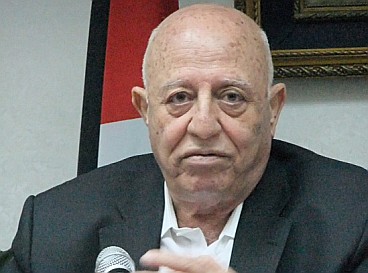
Ex-Premier of Palestine Ahmed Qurei
Earlier today in Jerusalem former Prime Minister Ahmed Qurei explained to us how he has been involved in almost all of the negotiations of recent decades and how, according to him, they have produced very little. The question of the relations between the two Palestinian factions Fatah and Hamas is an internal matter, and no-one should interfere, and to which he sees an imminent solution, provided those involved show some political courage. Progress in the peace process would be possible if Israel and Palestine could first agree that a Palestinian state should be established within the 1967 frontiers, before the occupation began. But as long as Israel refuses to talk about this, the matter would be blocked, and the Palestinians would pay the price.
How high a price, I see in Bethlehem, now sealed off from Jerusalem in a barbaric fashion by the Wall. The monstrous wall, several metres of concrete, means that the whole of community life is frustrated. Anyone who’s seen it will know that it’s a crime. The occupation, as a UN representative explains, is ruining the Palestinian economy and sabotaging any chance of a decent life. An example: Palestinians who have lived in Jerusalem their entire lives are treated now as if they were immigrants, with all of the draconian restrictions on their freedom of movement that this implies.
Today our delegation decided unanimously to send an urgent declaration to the Israeli government regarding the Palestinian hunger striker who is close to death. On behalf of the Council of Europe we ask them to show mercy and to comply at least with Israeli law. The latest clash which we saw in Bethlehem shows how explosive relations have become. The recently elected female mayor has issued an urgent call to us to give the Palestinians a chance to govern their own existence. Isn’t that an elementary human right?
Palestine
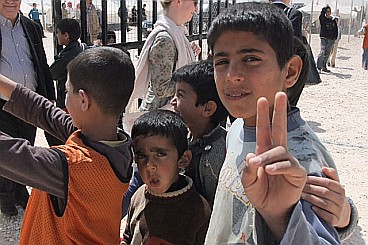
Half of Syrian refugees are children
11-04-2013 Yesterday evening the delegation met with ambassadors from various European countries in the French consulate in Jerusalem. Delegation head and French Senator Josette Durieu, didn’t hesitate to employ harsh language regarding Israel and Europe. European countries must now take a stand against the illegal, human rights abusing occupation and colonisation of the Palestinian Territories. There isn’t much time left before most of Palestine will be stolen. Jordan deserves a great deal more support for the reception of the enormous stream of refugees from Syria. As for Syria, the international community should show far more concern, she says, or things will go from bad to worse there.
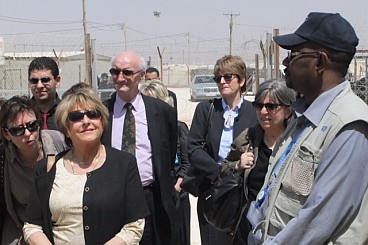
Delegation leader Josette Durieu: hard words for Israel and Europe
Today I devoted to people who could give me a better understanding of how Palestine, as a partner of the Council of Europe, could fulfil its obligations to that status, as later in the year I will have to present a report on this in Strasbourg. But first I have to appear live on Palestinian TV to speak about what myself and my colleagues have been doing all week.
During the day I meet with the director of the Electoral Council, who confirms that Palestine is ready to hold parliamentary and presidential elections, both on the West Bank and in Gaza. Registration in Gaza was like a festival, so keen are the people there to vote. Whether it will happen depends on Fatah and Hamas reaching an agreement. The two meet head-on today in the prestigious student elections at Bir Zeit University, just outside Ramallah. I go along there and speak with the university president, who says that the students have fought a hard campaign, but happily the fight was only verbal. There have been no incidents, which offers grounds for optimism. Later I find that Fatah remains the biggest party in the student council, though both Hamas and the Left Blok have gained seats. Lastly I meet with a large group of enthusiastic school and university students from Jerusalem, who are today having lessons in democracy. The aim was that I would simply say hello, but I was regaled with a whole series of relevant questions. I told them that if they were Palestine’s future, things would come good.
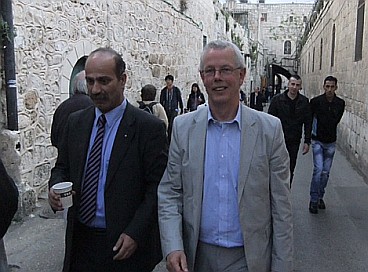
Senator Kox walking with Secretary General of the Palestinian Parliament Ibrahim Krishni
The Palestinian Chief Justice, who is charged with guarding the independence and quality of the courts, tells me that this is a real job and often one which had even been rendered impossible as a result of the occupation. How can you build the rule of law under an umbrella of lawlessness? I hear a comparable tale from the Palestinian Human Rights Commissioner, who doesn’t shy away from giving examples from the Palestinian side. ‘If I keep quiet about these,’ he says, ‘I weaken Palestine. That’s something our politicians should also realise.’ I promise to take this up in my report.
Lastly today comes a meeting with a number of mayors and councillors, who received their mandates last autumn when local elections were at last held, at least on the West Bank. These went well, I hear, though a Hamas boycott cast a shadow and meant that they could not be held in Gaza. That’s a pity, ‘but we couldn’t wait forever for local democracy,’ one of them says. I think that’s right.
